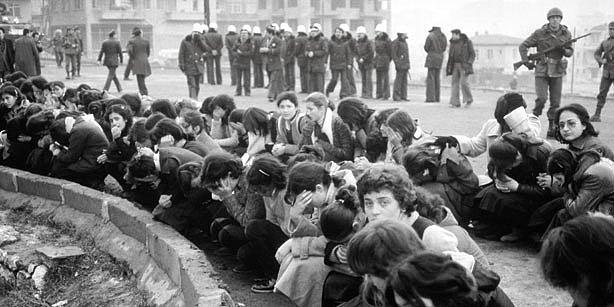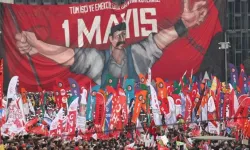In 1980 democratic process in Turkey has experienced a halt when General Kenan Evren has seized government on the early hours of September 12. Millions have been victims of military rule as the system in Turkey has been re-shaped under martial law.

[mks_dropcap style="letter" size="52" bg_color="#ffffff" txt_color="#000000"]O[/mks_dropcap]n the morning of September 12, 1980, former US military base in Ankara at Gölbaşı witnessed increased activities. General Chief of Staff and National Security Council Leader Kenan Evren and his comman units had conducted the coup which was planned at the General Command of Electronic Systems (GES); now under command of National Intelligence Service in Ankara's Gölbaşı.
Politicians were arrested, political parties and civil society organisations were shut down. When curfew was declared as part of martial law, pre-determined thousands of names were searched in addresses and locked in military and civilian prisons which went over-capacity, according to international institutes' reports of the time.
1980 Coup in Numbers

At the martial courts, in 210.000 court cases, 230.000 people have been put on trial. 30.000 people fled Turkey and took refuge in other countries, while 388.000 people were denied passport during military rule.
Journalists were subjected to harsh treatment, targeting and judicial intimidation. 300 journalists were attacked, 3 others were killed, 31 were subjected to prison sentences. A total of 3.315 years of prison sentence was given to journalists during this period.

Years after the military coup took place, Evren had stated “my hand did not even tremble once when signing off the death penalties”. Evren had added “when there was a rightist sentenced to death penalty I would let him wait until a leftist also gets sentenced to death; just to keep the balance.” Among the victims of death penalty application, Erdal Eren's name has become a symbolic one as he was underage by the time he was hanged. Eren was accused of murdering a soldier, and despite his underage status was known, with a court verdict his age had been increased and he was hanged on December 13, 1980 at the age of 17.
During the coup era, 650.000 people had been detained and kept in custody for up to 90 days officially even though in many cases unregistered custody period extended 150 days. 95% of the detainees during coup period had been subjected to torture and 171 lost their lives during torture. The witnesses of the time still refer to prisons of September 12 as torture-chambers. However, the harshest of all tortures are stated to have been conducted at Diyarbakır Prison where 34 lifeless detainees were carried out from.
In the first three years of the coup 183 people lost their lives while serving time in prison and 5 lost their lives in hunger strike.
State's surveillance capacity has also been boosted under the coup regime; almost 1.7 million citizens were profiled by the state and followed. 71.000 people were put on trial under 'thought crime' accusations; while another 58.000 were tried for membership to organisations; also 23.000 civil society organisations were shut down. 14.000 citizens also lost their citizenship and were denaturalized under military rule.
What Happened to the Coup Leaders?
Leadership of the coup had placed a bill in the constitution forbidding opening court cases against those who have served in the National Security Council. In the 2000s, Evren had said if there had been a trial attempt he would take his own life with the gun by his side. On the 30
th anniversary of the coup, a referendum had been passed reversing the prohibition of trials against National Security Council members. Thousands of citizens filed criminal complaints against the leaders, commanders, applicants of orders of the coup era.
Upon completion of investigation and preparation of the indictment, for the first time in Turkey a coup trial had been opened. On April 4, 2012 court case against the two living generals of 1980 military coup, Evren and Şahinkaya had started; the court case was dropped after both of them lost their lives of old age in 2015.
Commander of Interior Security of the time, Esat Oktay Yıldıran was responsible for fanatical levels of torture and brutal treatment of detainees across the country. Yıldıran was shot in the head and killed in front of his family on a public bus in Istanbul's Kısıklı in the year 1988.
 [mks_dropcap style="letter" size="52" bg_color="#ffffff" txt_color="#000000"]O[/mks_dropcap]n the morning of September 12, 1980, former US military base in Ankara at Gölbaşı witnessed increased activities. General Chief of Staff and National Security Council Leader Kenan Evren and his comman units had conducted the coup which was planned at the General Command of Electronic Systems (GES); now under command of National Intelligence Service in Ankara's Gölbaşı.
Politicians were arrested, political parties and civil society organisations were shut down. When curfew was declared as part of martial law, pre-determined thousands of names were searched in addresses and locked in military and civilian prisons which went over-capacity, according to international institutes' reports of the time.
1980 Coup in Numbers
[mks_dropcap style="letter" size="52" bg_color="#ffffff" txt_color="#000000"]O[/mks_dropcap]n the morning of September 12, 1980, former US military base in Ankara at Gölbaşı witnessed increased activities. General Chief of Staff and National Security Council Leader Kenan Evren and his comman units had conducted the coup which was planned at the General Command of Electronic Systems (GES); now under command of National Intelligence Service in Ankara's Gölbaşı.
Politicians were arrested, political parties and civil society organisations were shut down. When curfew was declared as part of martial law, pre-determined thousands of names were searched in addresses and locked in military and civilian prisons which went over-capacity, according to international institutes' reports of the time.
1980 Coup in Numbers
 At the martial courts, in 210.000 court cases, 230.000 people have been put on trial. 30.000 people fled Turkey and took refuge in other countries, while 388.000 people were denied passport during military rule.
Journalists were subjected to harsh treatment, targeting and judicial intimidation. 300 journalists were attacked, 3 others were killed, 31 were subjected to prison sentences. A total of 3.315 years of prison sentence was given to journalists during this period.
At the martial courts, in 210.000 court cases, 230.000 people have been put on trial. 30.000 people fled Turkey and took refuge in other countries, while 388.000 people were denied passport during military rule.
Journalists were subjected to harsh treatment, targeting and judicial intimidation. 300 journalists were attacked, 3 others were killed, 31 were subjected to prison sentences. A total of 3.315 years of prison sentence was given to journalists during this period.
 Years after the military coup took place, Evren had stated “my hand did not even tremble once when signing off the death penalties”. Evren had added “when there was a rightist sentenced to death penalty I would let him wait until a leftist also gets sentenced to death; just to keep the balance.” Among the victims of death penalty application, Erdal Eren's name has become a symbolic one as he was underage by the time he was hanged. Eren was accused of murdering a soldier, and despite his underage status was known, with a court verdict his age had been increased and he was hanged on December 13, 1980 at the age of 17.
During the coup era, 650.000 people had been detained and kept in custody for up to 90 days officially even though in many cases unregistered custody period extended 150 days. 95% of the detainees during coup period had been subjected to torture and 171 lost their lives during torture. The witnesses of the time still refer to prisons of September 12 as torture-chambers. However, the harshest of all tortures are stated to have been conducted at Diyarbakır Prison where 34 lifeless detainees were carried out from.
In the first three years of the coup 183 people lost their lives while serving time in prison and 5 lost their lives in hunger strike.
State's surveillance capacity has also been boosted under the coup regime; almost 1.7 million citizens were profiled by the state and followed. 71.000 people were put on trial under 'thought crime' accusations; while another 58.000 were tried for membership to organisations; also 23.000 civil society organisations were shut down. 14.000 citizens also lost their citizenship and were denaturalized under military rule.
What Happened to the Coup Leaders?
Leadership of the coup had placed a bill in the constitution forbidding opening court cases against those who have served in the National Security Council. In the 2000s, Evren had said if there had been a trial attempt he would take his own life with the gun by his side. On the 30th anniversary of the coup, a referendum had been passed reversing the prohibition of trials against National Security Council members. Thousands of citizens filed criminal complaints against the leaders, commanders, applicants of orders of the coup era.
Upon completion of investigation and preparation of the indictment, for the first time in Turkey a coup trial had been opened. On April 4, 2012 court case against the two living generals of 1980 military coup, Evren and Şahinkaya had started; the court case was dropped after both of them lost their lives of old age in 2015.
Commander of Interior Security of the time, Esat Oktay Yıldıran was responsible for fanatical levels of torture and brutal treatment of detainees across the country. Yıldıran was shot in the head and killed in front of his family on a public bus in Istanbul's Kısıklı in the year 1988.
Years after the military coup took place, Evren had stated “my hand did not even tremble once when signing off the death penalties”. Evren had added “when there was a rightist sentenced to death penalty I would let him wait until a leftist also gets sentenced to death; just to keep the balance.” Among the victims of death penalty application, Erdal Eren's name has become a symbolic one as he was underage by the time he was hanged. Eren was accused of murdering a soldier, and despite his underage status was known, with a court verdict his age had been increased and he was hanged on December 13, 1980 at the age of 17.
During the coup era, 650.000 people had been detained and kept in custody for up to 90 days officially even though in many cases unregistered custody period extended 150 days. 95% of the detainees during coup period had been subjected to torture and 171 lost their lives during torture. The witnesses of the time still refer to prisons of September 12 as torture-chambers. However, the harshest of all tortures are stated to have been conducted at Diyarbakır Prison where 34 lifeless detainees were carried out from.
In the first three years of the coup 183 people lost their lives while serving time in prison and 5 lost their lives in hunger strike.
State's surveillance capacity has also been boosted under the coup regime; almost 1.7 million citizens were profiled by the state and followed. 71.000 people were put on trial under 'thought crime' accusations; while another 58.000 were tried for membership to organisations; also 23.000 civil society organisations were shut down. 14.000 citizens also lost their citizenship and were denaturalized under military rule.
What Happened to the Coup Leaders?
Leadership of the coup had placed a bill in the constitution forbidding opening court cases against those who have served in the National Security Council. In the 2000s, Evren had said if there had been a trial attempt he would take his own life with the gun by his side. On the 30th anniversary of the coup, a referendum had been passed reversing the prohibition of trials against National Security Council members. Thousands of citizens filed criminal complaints against the leaders, commanders, applicants of orders of the coup era.
Upon completion of investigation and preparation of the indictment, for the first time in Turkey a coup trial had been opened. On April 4, 2012 court case against the two living generals of 1980 military coup, Evren and Şahinkaya had started; the court case was dropped after both of them lost their lives of old age in 2015.
Commander of Interior Security of the time, Esat Oktay Yıldıran was responsible for fanatical levels of torture and brutal treatment of detainees across the country. Yıldıran was shot in the head and killed in front of his family on a public bus in Istanbul's Kısıklı in the year 1988.






